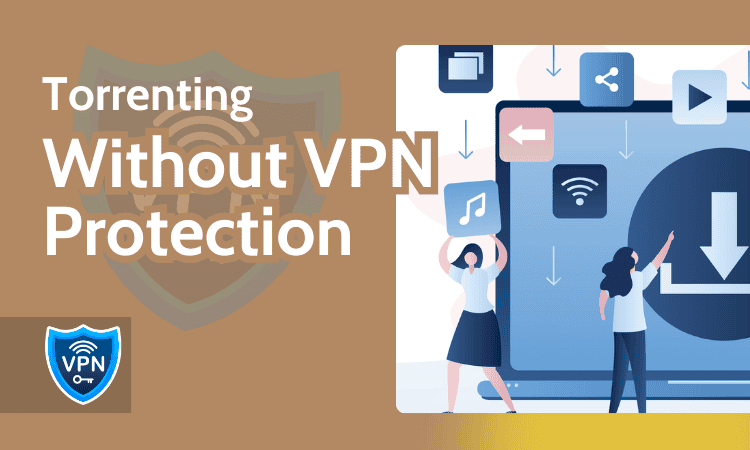
Key Takeaways: How Dangerous Is Torrenting Without a VPN?
- Torrenting without a VPN can expose your IP address and traffic to your ISP, copyright holders and copyright trolls (or anyone else downloading the same torrent as you). This can result in penalties ranging from fines to — in the most extreme cases — imprisonment.
- Some torrent downloads are infected with malware, especially on torrent sites where anyone can upload content. Only use trusted websites and uploaders to avoid malware.
- A VPN is the best way to stay safe while torrenting because it hides your real IP address and anonymizes your traffic.
Facts & Expert Analysis:
- Copyright vs public domain: The material you intend to download on a torrenting site is likely copyrighted. According to Go-Globe, 98.8% of content on torrenting sites is copyright protected.1
- Difference between industries: The porn industry is particularly litigious, with over 50% of copyright claims filed in 2022 originating with a single adult media company.2
- Nothing beats a kill switch: Ensure your VPN’s kill switch is activated while using the VPN to prevent data leaks. For comprehensive protection, activate your VPN’s system-wide kill switch if it offers one.
Torrenting is one of the easiest ways to download your favorite movies, music, books, games and apps. However, most torrent sites are filled with copyright-protected materials, and downloading them can get you in trouble. You might be hit with a cease-and-desist notice, or worse, be fined or imprisoned. That’s why torrenting without VPN coverage is a no-no.
When you torrent without a VPN, anyone connected to the same P2P network can see your IP address. Additionally, your ISP will be able to tell what you’re doing by examining the network protocol attached to your traffic.
We recommend connecting to a solid VPN before entering the treacherous world of torrenting. We’ve gathered a list of the best VPNs, but if you’re in a hurry, we recommend ExpressVPN. It’s the most secure VPN, with fast download and upload speeds perfect for torrenting. Keep reading to learn more about the dangers of torrenting and how you can avoid them.
Meet the experts
Learn more about our editorial team and our research process.
The Risks of Torrenting Without VPN Coverage: Why Do You Need One?
When you torrent without a VPN, your IP address will be visible to anyone else who’s downloading the same torrent. Furthermore, your internet service provider (ISP) will be able to tell that you’re downloading data over a P2P protocol. Note that torrenting isn’t illegal unless you download copyright-protected files, but ISPs often throttle P2P traffic regardless of what’s being downloaded.
If you get caught, you’ll usually just get a notice from your ISP alerting you of the copyright infringement. For example, in the U.S., you’ll get a DMCA notice informing you that you’re downloading copyright-protected files. Most countries and ISPs practice the three-strike rule, which means three warnings will be sent before stricter measures are implemented.
If you ignore the notices, the concerned party might take legal action against you. This might result in punishment, ranging from fines to imprisonment. For example, a torrent user in Denmark who downloaded and uploaded over 120TB of content received a suspended sentence of 80 hours of community service, 60 days’ probation and seizure of his computer.
Aside from copyright holders, copyright trolls are another group whose attention you risk catching. Copyright trolls are businesses that purchase enforcement rights from a creator and sue anyone who has used the material without permission. They often do it to make a profit.
To save yourself these troubles, be sure to use a VPN. It works by replacing your original IP address with a virtual one. Furthermore, it encrypts your internet connection, rendering it unreadable to third parties.
Torrenting Without a VPN in Canada
If you torrent without a VPN and download copyrighted content in Canada, you’ll be in violation of the Copyright Modernization Act. This law forbids uploading and downloading copyrighted material; infringement will attract a fine or imprisonment. Plus, Canadian ISPs have a habit of throttling the speeds of file-sharing platforms, including torrent sites.
Torrenting Without a VPN in Australia
You shouldn’t torrent without a VPN in Australia because its Copyright Amendment (Online Infringement) Bill 2018 frowns on downloading copyrighted content. Furthermore, Australian court orders have periodically blocked many torrent sites, including ThePirateBay and 1337x. You might need to spoof your location with a VPN to use torrent apps like BitTorrent.
Torrenting Without a VPN in the UK
The U.K.’s Digital Economy Act is designed to prohibit the sharing and downloading of copyright-protected content. The law requires that internet service providers (ISPs) send cease-and-desist orders to offenders. ISPs in the U.K. can also throttle internet speeds on torrent clients and sites.
Torrenting Without a VPN in the US
In the U.S., two main laws affect illegal P2P downloads. The Digital Millennium Copyright Act (DMCA) forbids uploads of copyright-protected content without permission. In addition, the No Electronic Theft Act (NET Act) prescribes fines and even imprisonment for people caught making financial gain from copyrighted works.
U.S. ISPs also have a reputation for being quick to comply with copyright holders and send out DMCA notices to their customers.
Will I Get Caught Torrenting?
Getting caught torrenting is possible because your ISP, content creators or copyright trolls might be monitoring your internet traffic (in the case of your ISP) or the P2P networks themselves. By piecing together your IP address and download history, they can trace illegal file downloads to you.
A classic example is the Dallas Buyers Club piracy case. Voltage Pictures, which released the award-winning movie ‘Dallas Buyers Club,’ identified 4,726 unique IP addresses that had downloaded the movie from BitTorrent. Voltage Pictures wanted to fine all the torrent users for illegally downloading the movie, but a bond set by an Australian court deterred them.
Though this case did not succeed, you’ll be better off ensuring that no content creator or copyright troll can trace downloads back to you. As we’ve mentioned, a VPN provides the necessary cover, changing your IP address and encrypting your online traffic.
It’s worth noting that one entertainment industry in particular makes a point out of going after torrenters, and that’s the porn industry. Out of 5,537 U.S. copyright infringement cases filed in 2022, a single company – Strike 3 Holdings, which owns several adult entertainment brands – filed 2,937, or 53% of the total.2
Is Torrenting Legal?
Yes, torrenting is legal in most countries, as long as you’re downloading or uploading materials that are not copyright protected. You’ll find some public domain and Creative Commons-licensed materials available for torrent. However, most content on torrenting sites is copyrighted, and downloading it might land you in trouble in many countries.

